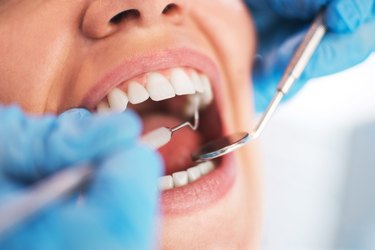
Some people can brush their teeth only once a day and still have a shiny white smile. Other people brush twice a day, floss, and use mouthwash, but are still prone to cavities. What gives?
It's true that our oral health is largely determined by our lifestyle habits — like how often we brush our teeth or whether we smoke — but our genetics can also influence our teeth, too. Still, just because your parents were prone to cavities or gum disease doesn't mean that you're destined to develop them, too.
Video of the Day
Video of the Day
The Role Genetics Play in Your Oral Health
When we talk about genetics, we're really talking about DNA — the material that provides all the information your cells need to function.
Think of your genetics as being like a computer motherboard, which provides the codes for the devices' processes and functions, says Walid Fakhouri, PhD, an associate professor of diagnostic and biomedical sciences at UTHealth Houston School of Dentistry. Without the codes, the computer wouldn't work — but without someone using the computer, all it is a screen and frame.
Same thing with DNA. "DNA doesn't work by itself or in a vacuum," Fakhouri says. "It's influenced by factors like your environment and lifestyle." Sometimes, our genetics can have a strong pull on our oral health — other times, our environment or lifestyle does.
Early Oral Health Conditions
As a general rule, oral conditions that develop early in life — meaning, at birth or during childhood — are likely strongly influenced by genetics, Fakhouri says. Conditions that develop later on tend to be influenced more by our diet or lifestyle.
For example, some people have conditions called hypodontia (the absence of one to five teeth) and oligodontia (the absence of six or more teeth) on their baby or permanent teeth, according to the National Organization for Rare Disorders (NORD). These conditions are largely genetic, Fakhouri explains.
Crooked teeth, too, can be impacted by a person's genes. "The shape and structure of the upper or lower jaw is mainly driven by a person's genetics," Fakhouri says. "If the upper jaw is smaller or larger, then you can have [an overbite or underbite] that leads to crooked teeth."
Oral Health Conditions That Develop Later in Life
As for conditions that aren't present at birth, like cavities and periodontal disease (i.e., gum disease, which is an inflammation of the gums and bones that surround the teeth), these are largely impacted by a person's lifestyle, although genetics can play a small role in their development.
Take cavities for instance. There's no one gene that's responsible for cavities — rather, there are at least 14 different genes that are thought to play a role in their development, according to the American Dental Association. Each gene can influence a person's saliva production, enamel structure, tooth minerals and more. People who have very hard enamel (i.e., the outer coating of the tooth) can be more resistant to developing cavities, Fakhouri says.
Same thing goes for periodontal disease. There are thought to be at least 11 genes that are thought to play a role in the development of gum disease, including those that control interleukins — i.e., a family of cytokines that play a role in inflammation — and those that are involved in tissue repair.
The Role Lifestyle Habits Play in Your Oral Health
Being genetically prone to, say, weak enamel doesn't necessarily mean you'll end up with a mouthful of cavities, though. In fact, it's thought that a person's environmental and lifestyle habits play a much larger role in the development of most oral health diseases than genetics, according to the ADA.
"We try to be careful not to say if your mom and dad have really good teeth, then that means you'll inherit very good genes," says Dr. Fakhouri. "With [certain oral] diseases, genetics only plays a minor role."
Cavities
Even if you were born with super-strong enamel, for example, you can still develop cavities if you don't brush and clean your teeth regularly. That's because cavities are largely caused by bacteria that has stayed on our teeth for too long. When we eat and drink sugar, the bacteria in our mouths produce an acid that attacks the tooth's enamel, eventually wearing it away until a hole (i.e., cavity) develops. Not brushing this bacteria away regularly — as well as eating too much sugary foods, too often — increases the risk of developing cavities.
Foods that are high in acids can also wear away the enamel in your teeth, setting you up for cavities, according to the ADA. Lemon juice, soda and juices are all acidic, as are sour candies that contain citric acid.
A sticky buildup of bacteria, known as plaque, can also cause gum disease — red, swollen, tender gums that can pull away from the teeth. Poor oral hygenie can be to blame, as can smoking or chewing tobacco, according to the ADA.
Bad Breath
The causes of bad breath (aka halitosis) are also primarily due to lifestyle habits, including smoking; it can also be caused by cavities. Poor dental hygiene, the presence of gum disease and a buildup of bacteria on the tongue may be responsible for about 85 percent of halitosis cases, per a June 2012 article in the journal Nature.
Bruxism
There's also teeth grinding, or bruxism, which often occurs when you sleep, according to the ADA. Teeth grinding can "wear off the enamel," Fakhouri says, as well as cause loose, painful teeth as well as fractures in the teeth. Stress and anxiety are common culprits, though the ADA notes that people who drink and smoke are twice as likely to grind their teeth as those who don't.
Oral Cancer
Oral cancer that appears after childhood is also often caused by lifestyle factors. "We know from a lot of studies that smoking, alcohol and viral infections like the human papillomavirus [HPV] can all be linked to oral cancer," Fakhouri says.
What to Do if You’re Genetically Prone to Dental Problems

While genetics have a small influence on your smile, many of the most common dental problems stem from lifestyle habits, like teeth brushing, smoking and our diets. No matter how high your risk of oral health problems, use these tips to take better care of your teeth.
1. Chase Citrus Foods With Water
Acidic foods can wear away at your teeth's enamel, Fakhouri says, so whenever you eat citrus fruits, like oranges or lemons, sip some water afterwards. "This lowers the pH level in your mouth, which helps neutralize the acids," he says.
As for high-sugar, acidic drinks, like sodas, lemonades and soft drinks, try to avoid them whenever possible or dilute them with more water.
2. Fill Up on Calcium
In general, what's good for your body is good for your teeth, says Fakhouri. In particular though, foods that are rich in calcium can go a long way in helping your teeth. "Calcium is important for the formation of the enamel in the teeth," he says, which helps protect against cavities. Dairy products, like milk, are good choices, as are almonds and leafy green vegetables, per the ADA.
3. Brush Your Teeth Twice a Day — and Especially at Night
The ADA recommends brushing your teeth twice a day, for two minutes at a time. And while many people brush once in the morning and once at night, some people skip their nighttime teeth brushing session — the one time when you really should brush your teeth, says Dr. Fakhouri.
The reason: If there's any lingering food in your teeth before you go to bed, the acid-producting bacteria in your mouth will be at work all night long, he explains.
4. Schedule Regular Dentist Visits
Ideally, you want to see a dentist before any dental problems appear, Fakhouri says. After all, by the time a cavity or gum disease develops, some damage to the teeth has already occurred. By seeing a dentist at regular intervals, you can prevent oral health problems before they start to occur.
For example, if plaque builds up on the teeth, it can eventually harden into tartar, according to the ADA. When tartar accumulates on the gums, it can cause gingivitis, a type of early gum disease. Here's the catch, though: Once tartar forms, it can only be removed by a professional cleaning — you won't be able to brush it away yourself, according to the Cleveland Clinic.
"The American Dental Association recommends having a six-month visit to a dental clinic for a checkup to remove plaque and check the health of the gums," Fakhouri says. "This prevents bigger problems or a detrimental disease."
- Centers for Disease Control and Prevention: "Periodontal Disease"
- American Dental Association: "Genetics and Oral Health"
- American Dental Association: "Genetic Testing and Your Dental Health"
- American Dental Association: "Erosion: What You Eat and Drink Can Impact Teeth"
- American Dental Association: "Gum Disease"
- Nature: "Halitosis: The Multidisciplinary Approach"
- American Dental Association: "Teeth Grinding"
- American Dental Association: "7 Non-Dairy, Calcium-Rich Foods for Your Teeth"
- National Organization of Rare Diseases: "Tooth Agenesis"
- ADA: "Plaque"
- Cleveland Clinic: "Dental Plaque"
- ADA: "Brushing Your Teeth"
Is this an emergency? If you are experiencing serious medical symptoms, please see the National Library of Medicine’s list of signs you need emergency medical attention or call 911.




